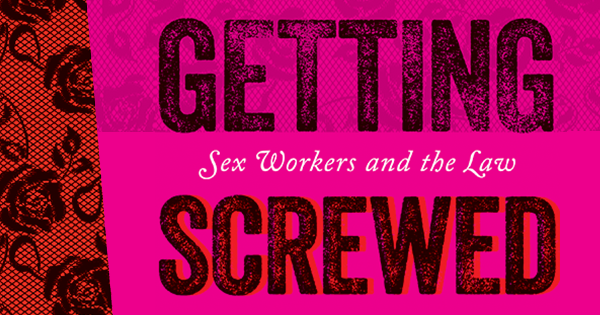
Prostitution is in the news these days: Texas netted 60 arrests from a sting operation in service of an anti-trafficking law; a famous comedian casually revealed that she was once a sex worker; a former NBA star was found unconscious in a Nevada brothel; and the only law in the United Kingdom against paying for sex is being challenged in Northern Ireland. Even The Economist is publishing op-eds about why decriminalizing sex work is a good idea. Into the fray comes Getting Screwed: Sex Workers and the Law, by journalism professor Alison Bass, a book-length argument for legalizing the world’s oldest profession.
Bass combines interviews with current and former sex workers with a comprehensive history of prostitution and the sexual revolution in America, along with the latest research on a thriving 21st-century trade. Read this excerpt on how the kinds of anti-trafficking laws being pushed in Texas actually harm the victims they are intended to protect.
In recent years, Congress has reauthorized the Trafficking Victims Protection Act several times, setting up multiagency task forces to expand the powers of law enforcement in investigating trafficking cases and spending more than $64 million to support those task forces and local police training in the United States. At the same time, forty-three states have passed anti-trafficking legislation.
Yet research indicates that, in some cases, the proliferation of state and federal laws has ended up hurting the very people these laws were designed to protect. For example, since the original Trafficking Victims Protection Act was passed in 2000, the total number of arrests of underage prostitutes has actually increased by almost 9 percent. Even though juveniles are supposed to be treated as victims, many end up being processed through the criminal justice system. In some cases, police arrest underage prostitutes in an effort to ensure that these kids get the services they need. …
However, researchers and legal advocates say that criminal laws actually create an atmosphere of mistrust and adversarial discord between police and sex workers, whether they’re underage or adults. “Why do you have to use the criminal law with punishment and the deliberate infliction of pain [on victims] in order to catch traffickers?” asks John Lowman, a sociologist at Simon Fraser University in British Columbia who has studied the sex industry in Canada for decades. “Sex workers are much more likely to come forward if you just talk to them than if you arrest them.
In fact, exposure to the criminal justice system can end up making the situation worse for trafficked victims. Some of the youngsters arrested for prostitution are sent to juvenile criminal facilities or foster homes where they are molested and traumatized all over again. And in the John Jay College study, some underage prostitutes said they were sexually assaulted by police or forced to provide sexual services for free.
Excerpted from Getting Screwed: Sex Workers and the Law by Alison Bass published by ForeEdge, an imprint of University Press of New England.

